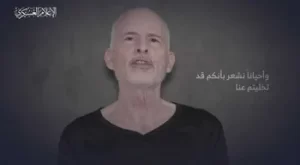Solidarity Mission to Israel 2024
BLOGS FROM THE MISSION
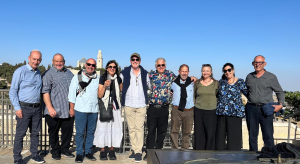
Danny Hochberg (3 May/4 May 2024):
Our Mission participants came together for Kabbalah Shabbat like the ingathering of the exiles, fulfilling the promise we made on Pesach, “next year in Jerusalem”.
Rabbi Stacey from the WUPJ, our spiritual leader for the Mission, led us in Shehecheyanu at the windmill in Yemen Moshe, overlooking the walls of the Old City.
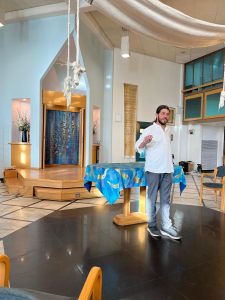 We enjoyed the Shabbat service at Kol Haneshama led by Rabbi Oded in Baka before our dinner in the home of expat Yonatan Glazer and his wife Helen. Yonatan is ex Melbourne and Netzer, and told us about his journey and his perspective on the current situation. We were lucky to also have Ittay Fleischer as our guest. Ittay is also an Oleh and is well known for his peace activism, his blogs (he has 7,000 followers!) as well as his journalism for The Jewish Independent (Plus61j). He is someone who places humanity before politics, reminding us of our obligations to care for all, particularly in a time of war.
We enjoyed the Shabbat service at Kol Haneshama led by Rabbi Oded in Baka before our dinner in the home of expat Yonatan Glazer and his wife Helen. Yonatan is ex Melbourne and Netzer, and told us about his journey and his perspective on the current situation. We were lucky to also have Ittay Fleischer as our guest. Ittay is also an Oleh and is well known for his peace activism, his blogs (he has 7,000 followers!) as well as his journalism for The Jewish Independent (Plus61j). He is someone who places humanity before politics, reminding us of our obligations to care for all, particularly in a time of war.
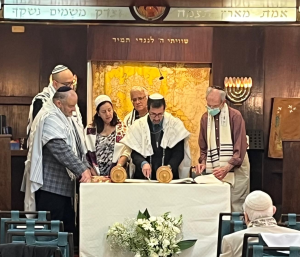 The next day we attended Har-El Synagogue for Shabbat services. A smaller synagogue than Kol Haneshama, it was the first Progressive synagogue in Israel. Four of our group were called to the Torah, Caryn Granek, Daniel Pedrosa, Peter Wise and Rabbi Sam Zwarenstein, and UPJ co-President Larry Lockshin spoke to the community. After Kiddush, we were honoured to have David Horovitz, Editor of The Times of Israel and past editor of the Jerusalem Post, speak to us, to provide us with some context for the week ahead of us.
The next day we attended Har-El Synagogue for Shabbat services. A smaller synagogue than Kol Haneshama, it was the first Progressive synagogue in Israel. Four of our group were called to the Torah, Caryn Granek, Daniel Pedrosa, Peter Wise and Rabbi Sam Zwarenstein, and UPJ co-President Larry Lockshin spoke to the community. After Kiddush, we were honoured to have David Horovitz, Editor of The Times of Israel and past editor of the Jerusalem Post, speak to us, to provide us with some context for the week ahead of us.  David’s skill, for those of you who read his weekly editorials that I post here, is to distill the complexities of the conflict and provide both context and explanation for the situation. He is not optimistic, and that in itself is challenging. Asked about the day after, he provides some insight, but tempers it with the reality that events often overtake analysis as quickly as it is presented. He talked about two key events: October 7 and April 14, the latter being the unprecedented Iranian attack on Israel. Everyone present took much away with them, and discussions continued well into the evening.
David’s skill, for those of you who read his weekly editorials that I post here, is to distill the complexities of the conflict and provide both context and explanation for the situation. He is not optimistic, and that in itself is challenging. Asked about the day after, he provides some insight, but tempers it with the reality that events often overtake analysis as quickly as it is presented. He talked about two key events: October 7 and April 14, the latter being the unprecedented Iranian attack on Israel. Everyone present took much away with them, and discussions continued well into the evening.
Following dinner at the First Station, we joined the local Reform community for Havdallah prior to participating in the protest for the release of the hostages. We were privileged to hear from the father of Hersh Polin, who was confirmed as alive after being seen in a video from Hamas.
BRING THEM HOME NOW!
Danny Hochberg (5 May 2024):
Today was filled with meaningful experiences and Yom Hashoah at Yad Vashem, which will be a highlight for many in the group.
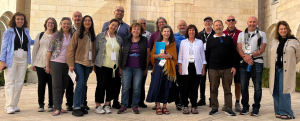 Our first stop was the Supreme Court. A beautiful building with meaning intentionally built into every crevice. It sits at a high point of the Government compound, deliberately situated above the Knesset to signify to Israel’s politicians that no-one is above the law. Prior to the war, the right-wing government laid siege to this concept and created the divisiveness that would play a role in October 7. Our guide at the court was one of its star litigators, the amazing Orly Erez-Likhovski, the Executive Director of the Israel Religious Action Centre, the Reform Movement’s centre for legal advocacy and public policy in Israel. Next stop was the Jewish Agency and a meeting with Deputy Chairman of the Executive, Yaron Shavit.
Our first stop was the Supreme Court. A beautiful building with meaning intentionally built into every crevice. It sits at a high point of the Government compound, deliberately situated above the Knesset to signify to Israel’s politicians that no-one is above the law. Prior to the war, the right-wing government laid siege to this concept and created the divisiveness that would play a role in October 7. Our guide at the court was one of its star litigators, the amazing Orly Erez-Likhovski, the Executive Director of the Israel Religious Action Centre, the Reform Movement’s centre for legal advocacy and public policy in Israel. Next stop was the Jewish Agency and a meeting with Deputy Chairman of the Executive, Yaron Shavit.

Due to changes in our schedule, we then met with Rabbi Yael Vurgan, who serves the communities of the Gaza Envelope, and has found her role change as she has had to deal with the massacre and post October 7 displacement of her communities.
 Supported by funds from our UIA Progressive Appeal, her important work showed us how effective our support can be. The group was allowed some free time to wonder through Machane Yehuda and enjoy the sights, sounds and bustle of the Shuk (and of course a felafel lunch!
Supported by funds from our UIA Progressive Appeal, her important work showed us how effective our support can be. The group was allowed some free time to wonder through Machane Yehuda and enjoy the sights, sounds and bustle of the Shuk (and of course a felafel lunch!
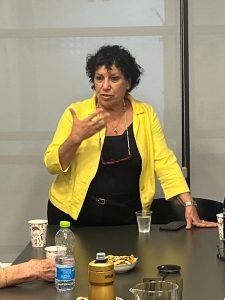 In the afternoon we met with Taly Levanon, CEO of the Israel Trauma Coalition, at its headquarters outside Jerusalem. It is the cornerstone in the treatment of trauma and emergency preparedness in Israel. She spoke of the challenges since October 7, and of being overwhelmed by the task. Exhausted from the challenge of Covid, Israel’s trauma counsellors had to regroup to deal with October 7. They have added more than 1,000 counsellors, and need the same again. We were left in awe of their work, but overwhelmed by the task ahead.
In the afternoon we met with Taly Levanon, CEO of the Israel Trauma Coalition, at its headquarters outside Jerusalem. It is the cornerstone in the treatment of trauma and emergency preparedness in Israel. She spoke of the challenges since October 7, and of being overwhelmed by the task. Exhausted from the challenge of Covid, Israel’s trauma counsellors had to regroup to deal with October 7. They have added more than 1,000 counsellors, and need the same again. We were left in awe of their work, but overwhelmed by the task ahead.
 After an early dinner we were back on the bus to Yad Vashem for the official Holocaust Commemoration Ceremony, in the presence of the President and Prime Minister of Israel. It was a cold Jerusalem night, and the speeches were somber, reflecting the mood of the country. In contrast, the stories of the six survivors who were chosen to light candles were inspiring. All six expressed their appreciation of Israel and their hope for a positive future, despite the incredible pain they suffered in their lives. It was very special for all of us to be at this event, shared with dignitaries, soldiers, survivors and friends, and will surely be a memory that will remain with us for many years.
After an early dinner we were back on the bus to Yad Vashem for the official Holocaust Commemoration Ceremony, in the presence of the President and Prime Minister of Israel. It was a cold Jerusalem night, and the speeches were somber, reflecting the mood of the country. In contrast, the stories of the six survivors who were chosen to light candles were inspiring. All six expressed their appreciation of Israel and their hope for a positive future, despite the incredible pain they suffered in their lives. It was very special for all of us to be at this event, shared with dignitaries, soldiers, survivors and friends, and will surely be a memory that will remain with us for many years.
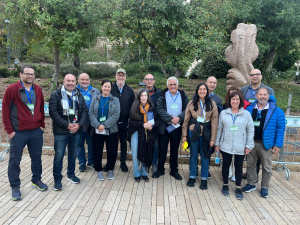
Danny Hochberg (6 May 2024):
Apologies for the late report but last night was long and we are all very tired! Today we said goodbye to Jerusalem, and left for the coastal plain on an unusually rainy day, likely the last until October.
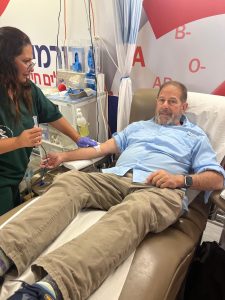
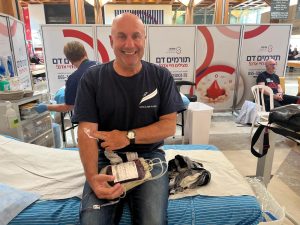
 We started our day in Sheba Hospital. The group split, with those of us able to going to donate blood while the rest joined hospital staff at their Yom Hashoah, Holocaust Commemoration. Regardless of where we were, at 10.00am the sirens went off everywhere in Israel and we all stood for one minute’s silence. This communal statement of memory is a strong symbol for all those that have the honour of experiencing it.
We started our day in Sheba Hospital. The group split, with those of us able to going to donate blood while the rest joined hospital staff at their Yom Hashoah, Holocaust Commemoration. Regardless of where we were, at 10.00am the sirens went off everywhere in Israel and we all stood for one minute’s silence. This communal statement of memory is a strong symbol for all those that have the honour of experiencing it.
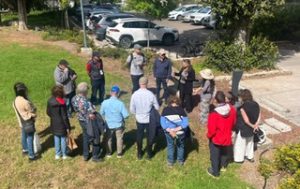 The blood donors were given the honour of bikuach nefesh. The rest of the group participated in a much more personal ceremony than the official ceremony the previous night, which featured chief fundraiser of Sheba who lost both her mother in Auschwitz but her farther survived. They made Aliyah and the father remarried but she never told anyone anyone that her stepmother was not her real mother until her stepmother passed. At the ceremony in a very moving moment she was presented with a picture of her natural mother who was killed. There was not a dry eye in the hall.
The blood donors were given the honour of bikuach nefesh. The rest of the group participated in a much more personal ceremony than the official ceremony the previous night, which featured chief fundraiser of Sheba who lost both her mother in Auschwitz but her farther survived. They made Aliyah and the father remarried but she never told anyone anyone that her stepmother was not her real mother until her stepmother passed. At the ceremony in a very moving moment she was presented with a picture of her natural mother who was killed. There was not a dry eye in the hall.
As if emotions were not high enough, we then visited the rehabilitation unit and soldiers injured in Gaza and the North. The facilities and the staff are amazing. They are coping with hundreds of cases, not seen in such quantities since 1973 War. We met Wahine Abo, a Druze soldier who, following a Hezbollah missile attack on a church on 26th December was sent to rescue injured civilians. Hezbollah expected this, and when they arrived attacked again.
Wahine was injured in the hip. He has endured 19 surgeries since then and remains in a wheelchair. Despite this, his good humour and optimism stood out, and he left us with Am Yisrael Chai.
We then embarked on a beautiful drive North to Kibbutz Mishmar Haemek. The drive through the Yizre’el Valley was particularly green and pastoral. Mishmar Haemek, one of Israel’s oldest Kibbutzim, after October 7 invited the entire community of Kibbutz Nachal Oz to come to them after the evacuation. They remain there today thanks to this generosity, without any help from the government.
 We met with Amir Tibon, a member of Kibbutz Nachal Oz and a well known Ha’aretz journalist. He told us the story of the kibbutz, which was celebrating its 70th anniversary in October! Despite the kibbutz’s close proximity to Gaza and incidents of attacks by rocket, the kibbutz had never had a terrorist set foot on its land.
We met with Amir Tibon, a member of Kibbutz Nachal Oz and a well known Ha’aretz journalist. He told us the story of the kibbutz, which was celebrating its 70th anniversary in October! Despite the kibbutz’s close proximity to Gaza and incidents of attacks by rocket, the kibbutz had never had a terrorist set foot on its land.
This all changed on October 7. In the nearby army base, 60 soldiers, half of which were female, were murdered. Fifteen members of the kibbutz were murdered. Amir spoke of the great failure of the government. His personal experience was over 10 hours in his safe room with his wife and children without electricity, toilets or food. Eventually his father came from Tel Aviv, and fought his way to save them.
Amir spoke of a personal sense of humiliation, as well as a national one, and the sense of abandonment they still feel, from the government and the army.
I might add that throughout our time there, overhead we heard the roar and saw the jets making sorties over Lebanon, following an incident on the northern border.
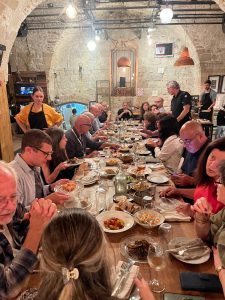 After our time at Mishmar Haemek, we drove to Haifa. Our hotel on the top of the Carmel had beautiful views over Haifa Bay all the way to the hills of Lebanon. That night we enjoyed dinner at Hamam Al Pasha, an old Turkish Hamam turned into a restaurant. It is an amazing restaurant and we were lucky to have as our guests the senior team of the WUPJ. Particularly interesting was the speech by President Sergio Bergman, who spoke of the different world post-October 7. Rabbi Bergman said that today to be a Zionist is to take responsibility. He spoke of the passing of the survivors of the Holocaust, and that now we are the “witnesses”. He talked about his newly minted term “global”, dealing with global issues locally. Finally he stated that the war we are embroiled in is not a war in the Middle East, but a World War, where the fight is not just for territory, but also for values and beliefs, everywhere.
After our time at Mishmar Haemek, we drove to Haifa. Our hotel on the top of the Carmel had beautiful views over Haifa Bay all the way to the hills of Lebanon. That night we enjoyed dinner at Hamam Al Pasha, an old Turkish Hamam turned into a restaurant. It is an amazing restaurant and we were lucky to have as our guests the senior team of the WUPJ. Particularly interesting was the speech by President Sergio Bergman, who spoke of the different world post-October 7. Rabbi Bergman said that today to be a Zionist is to take responsibility. He spoke of the passing of the survivors of the Holocaust, and that now we are the “witnesses”. He talked about his newly minted term “global”, dealing with global issues locally. Finally he stated that the war we are embroiled in is not a war in the Middle East, but a World War, where the fight is not just for territory, but also for values and beliefs, everywhere.
It was a late night, and all were relieved to rest their heads on their pillows.
Danny Hochberg (7 May 2024):
 In the morning, Netzer Shnatties Joel, Sam and Ella joined us for the day with their madricha, Naama.
In the morning, Netzer Shnatties Joel, Sam and Ella joined us for the day with their madricha, Naama.
Our first stop was Beit Geffen in the Hadar district of Haifa, where we were hosted by Shari. An Arab-Jewish cultural center founded in 1963 as a pioneer in the field of intercultural dialogue, is a non-profit organisation that strives to establish equalitarian and shared spaces that contain the diversity of identities and cultures in Israel and worldwide.
 We then had the opportunity to meet with Sally Abed. Sally Abed is a Palestinian activist and a national leader at Omdim Beyachad. Sally is a prominent progressive Palestinian voice, a recurring guest on the “Promised” podcast and the co-host of “Groundwork” – a podcast miniseries about Palestinians and Jews refusing to accept the status quo and working together for change. Sally is very charismatic and a strong advocate for Palestinian Israelis. Recently elected to the Haifa Municipal Council, it was clear to all that we were speaking to someone who is a future leader in Israel.
We then had the opportunity to meet with Sally Abed. Sally Abed is a Palestinian activist and a national leader at Omdim Beyachad. Sally is a prominent progressive Palestinian voice, a recurring guest on the “Promised” podcast and the co-host of “Groundwork” – a podcast miniseries about Palestinians and Jews refusing to accept the status quo and working together for change. Sally is very charismatic and a strong advocate for Palestinian Israelis. Recently elected to the Haifa Municipal Council, it was clear to all that we were speaking to someone who is a future leader in Israel.
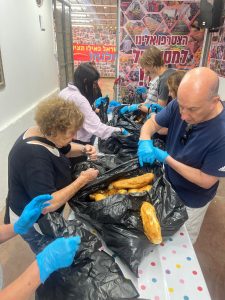
 It is always challenging to hear a narrative that does not fit with your own, and our group unpacked and debated the issues raised on the long bus journey to Padres Hannah. There we volunteered with Potchim et Shalev, which was founded by local youth to provide food for needy families in the town. Since the start of the war they have also helped families of evacuees and soldiers. The program is supported by Yahel, which supports such local initiatives, and we were pleased to have Director Dana with us. The group rolled their sleeves up and packed meals to be distributed that day.
It is always challenging to hear a narrative that does not fit with your own, and our group unpacked and debated the issues raised on the long bus journey to Padres Hannah. There we volunteered with Potchim et Shalev, which was founded by local youth to provide food for needy families in the town. Since the start of the war they have also helped families of evacuees and soldiers. The program is supported by Yahel, which supports such local initiatives, and we were pleased to have Director Dana with us. The group rolled their sleeves up and packed meals to be distributed that day.
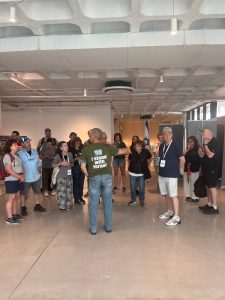 Following a drive down the coastal highway, we met with Ronen Koehler, one of the founders of Brothers in Arms. They are situated in the unlikely Cinema City Glilot (next to the not-so-secret Mossad headquarters). Ronen epitomises the Sabra whose image was romanticised by so many of us when we thought of the chalutzim of old: humble, generous, open and dedicated to service for the nation. Brothers in Arms (Hebrew: אחים לנשק), also known as Achim Laneshek and Brothers and Sisters in Arms, is an organisation of reserve men and women from various units in the IDF, operating as part of the protests against the judicial reform.
Following a drive down the coastal highway, we met with Ronen Koehler, one of the founders of Brothers in Arms. They are situated in the unlikely Cinema City Glilot (next to the not-so-secret Mossad headquarters). Ronen epitomises the Sabra whose image was romanticised by so many of us when we thought of the chalutzim of old: humble, generous, open and dedicated to service for the nation. Brothers in Arms (Hebrew: אחים לנשק), also known as Achim Laneshek and Brothers and Sisters in Arms, is an organisation of reserve men and women from various units in the IDF, operating as part of the protests against the judicial reform.
Since October 7, 2023, the day Hamas attacked in southern Israel, Brothers in Arms has suspended all political and protest activities and devoted itself full-time to aid and relief. They stood in where the government was absent. In Ronen’s own words: “Being a citizen, it is not enough to vote and pay taxes. In a democracy you need to be involved. You cannot outsource the future to politicians. Our approach is not political. This government has failed to provide for the needs of the people. Thus change must happen.”
 After settling into our hotel in Tel Aviv, we embarked on a treat. We drove to beautiful Kfar Shmaryahu and enjoyed dinner as guests of the Australian Ambassador to Israel, Ralph King. We had a beautiful dinner at his residence, and found him a charming host. No doubt he is challenged by the complexity of his posting, and the timing of events and we appreciated his taking time out to be with us.
After settling into our hotel in Tel Aviv, we embarked on a treat. We drove to beautiful Kfar Shmaryahu and enjoyed dinner as guests of the Australian Ambassador to Israel, Ralph King. We had a beautiful dinner at his residence, and found him a charming host. No doubt he is challenged by the complexity of his posting, and the timing of events and we appreciated his taking time out to be with us.
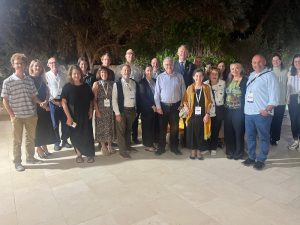 Tomorrow will be tough, as we go South to the Gaza Envelope.
Tomorrow will be tough, as we go South to the Gaza Envelope.
Danny Hochberg (7 May 2024):
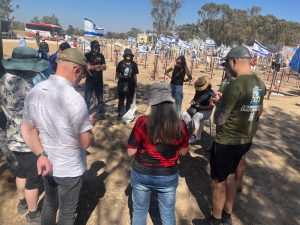 Today was never going to be easy. We left Tel Aviv early to travel South. The last few days have seen quite a bit of unrest in the South. Four soldiers were killed by mortar fire in Keren Shalom where the IDF have been gathering in anticipation of a Rafah incursion. This unrest has continued into the week. As a result we had to change our schedule slightly.
Today was never going to be easy. We left Tel Aviv early to travel South. The last few days have seen quite a bit of unrest in the South. Four soldiers were killed by mortar fire in Keren Shalom where the IDF have been gathering in anticipation of a Rafah incursion. This unrest has continued into the week. As a result we had to change our schedule slightly.
The JNF tree planting at Re’im was cancelled by home command, sadly. We also had to change the meeting place for our briefing on Gaza from the Black Arrow lookout, which is too exposed.
 Our first stop was Kfar ARZA, where we met Chen Kotler. She was born on the Kibbutz and has lived there most of her life. The Kibbutz is a Gan Eden. Beautiful gardens and pastoral fields in a peaceful location. That all changed on October 7 around 6.30 am when the Kibbutz was overrun by over 150 terrorists. Their home guard squad numbered 10. The terrorists knew where their armoury and control room where. When the home guard rushed to the armoury, they were anbushed, and picked off one by one. The militants attacked the village from four directions.They destroyed the gate around the town’s perimeter and indiscriminately killed residents, torched cars and homes, and forced entry to homes using rocket-propelled grenades.More than a hundred civilians died, while others were kidnapped and held hostage.
Our first stop was Kfar ARZA, where we met Chen Kotler. She was born on the Kibbutz and has lived there most of her life. The Kibbutz is a Gan Eden. Beautiful gardens and pastoral fields in a peaceful location. That all changed on October 7 around 6.30 am when the Kibbutz was overrun by over 150 terrorists. Their home guard squad numbered 10. The terrorists knew where their armoury and control room where. When the home guard rushed to the armoury, they were anbushed, and picked off one by one. The militants attacked the village from four directions.They destroyed the gate around the town’s perimeter and indiscriminately killed residents, torched cars and homes, and forced entry to homes using rocket-propelled grenades.More than a hundred civilians died, while others were kidnapped and held hostage.
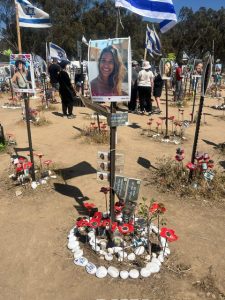 With Chen, we toured the kibbutz; in the background, periodic booms from Israeli artillery. We sit on her porch, overlooking her beautiful garden, and she tells us of the battle that took place in this very place! We saw where heroes fell defending their families. We passed torched houses. We entered the young adults section, and saw the destruction. We heard stories about those killed; those abducted; those raped. These were Cohen’s neighbours, her family. It tore our hearts to see and hear.
With Chen, we toured the kibbutz; in the background, periodic booms from Israeli artillery. We sit on her porch, overlooking her beautiful garden, and she tells us of the battle that took place in this very place! We saw where heroes fell defending their families. We passed torched houses. We entered the young adults section, and saw the destruction. We heard stories about those killed; those abducted; those raped. These were Cohen’s neighbours, her family. It tore our hearts to see and hear.
She asked only one thing of us: “Go and tell others what happened her. Describe what you see. And, do not forget our hostages”. At times we all needed silence to gather our thoughts as we looked at the destruction, or peered through the fence to Gaza, less than a kilometre away. Our sadness was tinged with anger. It’s hard to not feel the rage of revenge wash over you at the stories of loss. The bravery of the few is beyond words. The anger at the army’s failure to appear is balanced by the stories of heroism when they did. Just so much to unpack. Like the bullet holes that riddle the walls of Kfar ARZA, we were left with an emptiness that will not heal easily.
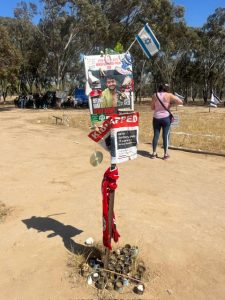 From Kfar ARZA, we drive to Sderot, the largest town in the Gaza Envelope. There we met Col(Res) Kobi Marom. He took us to a lookout above the town from where we can see Northern Gaza laid out before us, with the shimmering Mediterranean behind. He provided us with a geopolitical briefing which like so many we receive, is scathing of both the current government and the army.
From Kfar ARZA, we drive to Sderot, the largest town in the Gaza Envelope. There we met Col(Res) Kobi Marom. He took us to a lookout above the town from where we can see Northern Gaza laid out before us, with the shimmering Mediterranean behind. He provided us with a geopolitical briefing which like so many we receive, is scathing of both the current government and the army.
We were taken to the Municipality War Room. Here we saw the teams monitoring every public space in Sderot. On their large screens they showed us the instance the terrorists enter the city. We saw a father being shot, his child stood by him, then ran towards her mother. It was heartbreaking.
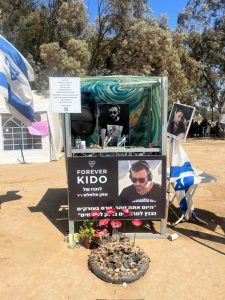 We saw the terrorists attack the police station. We later saw the location of the police station where attackers overpowered the garrison at the local police station and occupied it, killing approximately 30 people (including police officers and civilians).
We saw the terrorists attack the police station. We later saw the location of the police station where attackers overpowered the garrison at the local police station and occupied it, killing approximately 30 people (including police officers and civilians).
Following the arrival of IDF reinforcements, IDF troops surrounded the police station and regained control over it, killing at least 10 Hamas militants. Gunfire and bulldozers were used to demolish the Sderot police station and kill any gunmen remaining inside. I should add that despite the tragedy, more than 70 per cent of the residents have returned to their homes.
 Because we were with Kobi, we then travelled to Urim army base. Urim Base is an Israeli intelligence-gathering installation, supposedly part of the Unit 8200, the signal intelligence unit of the Intelligence Corps of the Israel Defense Forces. It is located approximately 30 km from Beersheba, a couple of kilometres north of the kibbutz of Urim. The base had only 13 soldiers on base that morning, none of them combat soldiers and six of them women. Adam, a captain on the base, walked us around, telling us about the battle that ensued when 10 heavily armed terrorists blew up the gate and entered. As we walked, we stood where the soldiers fell. The terrorists managed to enter the war room of the base, and there killed most of the soldiers. Seven of the 13 fell that day.
Because we were with Kobi, we then travelled to Urim army base. Urim Base is an Israeli intelligence-gathering installation, supposedly part of the Unit 8200, the signal intelligence unit of the Intelligence Corps of the Israel Defense Forces. It is located approximately 30 km from Beersheba, a couple of kilometres north of the kibbutz of Urim. The base had only 13 soldiers on base that morning, none of them combat soldiers and six of them women. Adam, a captain on the base, walked us around, telling us about the battle that ensued when 10 heavily armed terrorists blew up the gate and entered. As we walked, we stood where the soldiers fell. The terrorists managed to enter the war room of the base, and there killed most of the soldiers. Seven of the 13 fell that day.
In the repaired building we watched the events unfold via film taken from the security cameras and the personal cameras of the terrorists. It was really hard to watch, to see young people fall in battle in such close quarters. The arrival of forces from a nearby base ensured all 10 terrorists were killed. I felt no sympathy for them. Only rage at their act of terror.
We then joined soldiers of 5704 Battalion for lunch and the opportunity to speak with them. In a lighter moment, I addressed them and gave them our thanks and appreciation, in Hebrew, in what might possibly be the worst speech they will ever hear!
 Already drained, we had one more destination, the Nova Festival site, where 364 civilians were killed and many more wounded by Hamas at the Supernova Sukkot Gathering, an open-air music festival near Kibbutz Re’im. At least 40 hostages were also taken. There are shrines for each person murdered which have been adorned with momentos by family and friends: the scarf of a favourite football team, jewellery, flowers. It’s an overwhelmingly sad site. These memorials sit under the baking sun, the dust swirls around them and us, embracing us in sorrow. A sorrow that down not allow our tears to reach the hallowed ground as they dry on reddened cheeks. The loss of so many young people.
Already drained, we had one more destination, the Nova Festival site, where 364 civilians were killed and many more wounded by Hamas at the Supernova Sukkot Gathering, an open-air music festival near Kibbutz Re’im. At least 40 hostages were also taken. There are shrines for each person murdered which have been adorned with momentos by family and friends: the scarf of a favourite football team, jewellery, flowers. It’s an overwhelmingly sad site. These memorials sit under the baking sun, the dust swirls around them and us, embracing us in sorrow. A sorrow that down not allow our tears to reach the hallowed ground as they dry on reddened cheeks. The loss of so many young people.
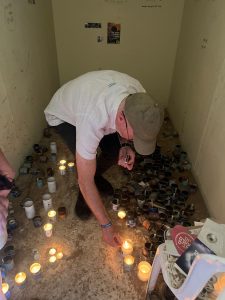 What did Bono from U2 say: “ These are music people, our people.” We form a circle and link arms in an impromptu service led by Rabbis Stacey and Sam. Together we sing Am Yisrael Chai and pray for the strength of the Jewish people. We leave our memorial candle, amongst many at the makeshift shrine, and return to the bus.
What did Bono from U2 say: “ These are music people, our people.” We form a circle and link arms in an impromptu service led by Rabbis Stacey and Sam. Together we sing Am Yisrael Chai and pray for the strength of the Jewish people. We leave our memorial candle, amongst many at the makeshift shrine, and return to the bus.
We drive North to Tel Aviv, Gaza to our left, sitting on its raised platform, its buildings feel empty and innocuous from a distance. The pastoral fields of kibbutzim to our right, serene sentinels to the events of October. Entering Tel Aviv after such a difficult journey feels surreal. Maybe everywhere will feel surreal for quite a while as we sort through these experiences. I am glad for having Sandra and our group with me. Just their presence, but also their strength make this impossible journey a little easier.
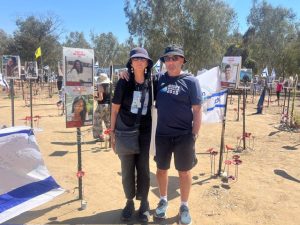 Am Yisrael Chai.
Am Yisrael Chai.
Danny Hochberg (9 May 2024 – Part 1)
Today was always going to be long. We got up at 4.30am to leave early for Jerusalem to participate in Women of the Wall’s Rosh Chodesh prayers at the Western Wall. Women of the Wall (WOW)’s central mission is to attain social and  legal recognition of the right, of women, to wear prayer shawls, pray, and read from the Torah, collectively and aloud, at the Western Wall.
legal recognition of the right, of women, to wear prayer shawls, pray, and read from the Torah, collectively and aloud, at the Western Wall.
Every Rosh Chodesh the Women of the Wall meet at the Kotel. Rosh Chodesh, literally translated as “the head of the month,” is the celebration of each new month of the Hebrew calendar. Refusing to accept that women can’t pray freely at the Western Wall, a group of women were inspired to commit to the custom of praying publicly as a women’s prayer group at the Western Wall every Rosh Chodesh. This cemented the formation of WOW and more than three decades later, the WOW community continues to meet on this day.
 WOW’s prayer service is a demand for equality at the Western Wall, related to WOW’s mission for women’s right to pray freely at the Western Wall, including singing, putting on tefillin. We were honoured to have past Executive Director, Lesley Sachs accompany us. It is a confronting experience. The Orthodox organise to disrupt the prayer, especially through using young children. The ladies had young Yeshiva girls disrupt services by placing chairs so that the group could not pray together. The young girls tried to drown out the WOW women and abused some of the group. The men also received abuse from Rabbis, Yeshiva bochers and the odd hilltop youth ( young religious fanatics from settlements in the West Bank that enter the
WOW’s prayer service is a demand for equality at the Western Wall, related to WOW’s mission for women’s right to pray freely at the Western Wall, including singing, putting on tefillin. We were honoured to have past Executive Director, Lesley Sachs accompany us. It is a confronting experience. The Orthodox organise to disrupt the prayer, especially through using young children. The ladies had young Yeshiva girls disrupt services by placing chairs so that the group could not pray together. The young girls tried to drown out the WOW women and abused some of the group. The men also received abuse from Rabbis, Yeshiva bochers and the odd hilltop youth ( young religious fanatics from settlements in the West Bank that enter the 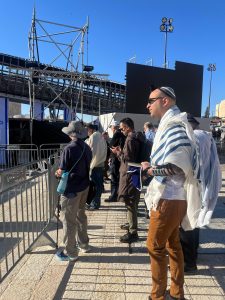 Temple Mount every Rosh Chodesh). It’s both empowering and equally depressing experience.
Temple Mount every Rosh Chodesh). It’s both empowering and equally depressing experience.
From there we went to the Foreign Ministry where we met with Dudi Levy, Head of the Pacific Department, Chamoutal Roger, Head of the Diaspora Dept., Amir Meron who is to be posted to Canberra, Mordechai Rodgold, previous Ambassador to Austria, and Sarah Weis-Maoudi, Legal Adivisor in the MFA. That was a lot of officials! We sat in the same room that Blinken meets. To summarise, we learnt a little about the role of the UN and the difficulty in dealing with an organisation that has an inherent bias to Israel. In this context we provided strong feedback of the need for Israel to respond quicker to claims made in the media. There was definitely a sense of disappointment on the part of the officials with regard to the change in Australia’s stance since October 7. This on the cusp of Australia’s support for the 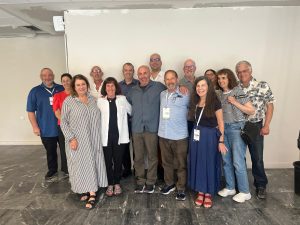 UN resolution that provides for greater recognition for Palestinian Statehood. We were with good people faced with the most challenging task of representing Israel in often hostile countries and circumstances.
UN resolution that provides for greater recognition for Palestinian Statehood. We were with good people faced with the most challenging task of representing Israel in often hostile countries and circumstances.
We returned to Tel Aviv and had the opportunity to meet first with Israel Religious Action Centre advocate Nicki Maor (an ex-Australian) and Gregory Kotler, a Reform rabbi from Ramat Gan who is very active in supporting refugees to Israel, particularly women who are caught in difficult or violent relationships. We also heard from them about the issues around marriage reform. Who knew you could be married via Zoom through the state of Utah.
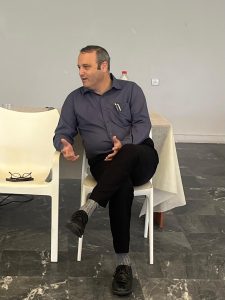 We then met with Rabbi Gilad Kariv, former CEO of the Israel Movement for Reform and Progressive Judaism. Rabbi Kariv is currently a member of the Knesset for the Labor Party. He spoke across three key themes: 1. Recognition that events in Israel have an impact on Jews in the Diaspora; 2. The role of the IMPJ in connecting non-Orthodox communities in Israel back to Judaism, particularly given the need to counter the rise of nationalist Orthodox extremism; 3. The importance of the political left in promoting an alternate voice and vision, particularly in light of the lack of vision from the current government and the centre parties. His voice is strong and determined, and as the only Reform Rabbi in the Knesset, it is an important one.
We then met with Rabbi Gilad Kariv, former CEO of the Israel Movement for Reform and Progressive Judaism. Rabbi Kariv is currently a member of the Knesset for the Labor Party. He spoke across three key themes: 1. Recognition that events in Israel have an impact on Jews in the Diaspora; 2. The role of the IMPJ in connecting non-Orthodox communities in Israel back to Judaism, particularly given the need to counter the rise of nationalist Orthodox extremism; 3. The importance of the political left in promoting an alternate voice and vision, particularly in light of the lack of vision from the current government and the centre parties. His voice is strong and determined, and as the only Reform Rabbi in the Knesset, it is an important one.

Danny Hochberg (9 May 2024 – Part 2)
After a quick change of clothes and freshen up at the hotel, we were on the road again! This time it was to Kikar Hashitufim – Hostage Square. Hostages Square is a public plaza located in front of the Tel Aviv Museum of Art.
Since the 7 October 2023 Hamas-led attack on Israel, families of the hostages taken during the attack have encamped in the square, due to its proximity to the Israel Defense Forces headquarters. In addition, it has been the site of rallies and protests calling for the release of the hostages.
There are many installations and memorials on the square from a model of a tunnel which when you walk through, simulates the tunnels Hamas holds the hostages in. It is dark, claustrophobic, and the air is stale. As you walk through you hear the muffled sounds of war simulating what the hostages may hear. It is a very grounding experience. Of course there is the empty Shabbat table, sculptures of ribbons, a wall of hostage posters. For me it is the pictures of the hostages, staring back at us, often smiling, that remains the most haunting. It is their humanity that shines back at me, that breaks my heart. The group purchase some hostage paraphernalia and then we are back on the bus to Beit Daniel.
Established in 1991, the Daniel Center, comprised of Tel Aviv’s first Reform wynagogue, Beit Daniel Center for Progressive Judaism and Mishkenot Ruth Daniel (an education center and guest house), aims to expose Israelis to Progressive Jewish values. Hosting us was Rabbi Meir Azari. Hostage Square was a good segway to our next speaker, Lee Seigel, whose brother Keith Siegel is a hostage from Gaza. Keith and Lee are originally from North Carolina. Lee lives on Kibbutz Gezer and Keith on Kibbutz Gezer. I actually met Keith when I came in October, only a few weeks after the start of the war. He was already, at that early time, protesting for Lee’s release. Seven months have passed since then! Keith and his wife, Aviva, were kidnapped from Kibbutz ARZA. They spent 51 days together in Gaza. They moved 13 times and were constantly guarded by terrorists. They had no access to news. They spent long periods in tunnels, often with little air. In November, as part of the only hostage release period, on day 4, Aviva was separated from Keith and released. Keith remains in captivity, but hope remains he is alive as a few weeks ago Hamas released a video of Keith alive (CLICK HERE to view video).
Lee is quietly spoken, and at times very emotional. It is clear that the trauma has affected him greatly. He is angry at a government he feels has failed to prioritise the hostages, but he remains hopeful for Lee. It was a moving experience for the entire group.
There was little time to digest this as we sat down for our final meal together. Given the importance that many have placed on the first UPJ Solidarity Mission to Israel, we had many special guests with us, many of whom who helped make it happen. From the WUPJ was Rabbis Sergio Bergman and Stacey Blank, and Phyllis Dorey and Andrew Keene, the WUPJ Chair and treasurer respectively. From the Israel Movement for Progressive Judaism (IMPJ) we had Rabbis Meir Azari and Naomi Efrat, IMPJ Chair Yair Lootstein, Israel Movement for Progressive Judaism (IMPJ) CEO Anna Kaslinski , Orly Erez-Likhovski, CEO of the Israel Religious Action Centre, and IMPJ leaders David Bernstein, Lesley Sachs and Noga Maliniak. Our guest speaker was Asaf Zamir, an Israeli politician and diplomat, who served as Deputy Mayor of Tel Aviv from 2008-13 and Acting Mayor in charge of education from 2013-18. He was elected to the Knesset in 2019, serving in two spells until 2021. He also held the post of Minister of Tourism from May to October 2020. He was Consul General in New York from October 2021 until his resignation in March 2023, in protest at Prime Minister Binyamin Netanyahu’s decision to fire Defense Minister Yoav Gallant. Currently Deputy Mayor of Tel Aviv, he was an interesting guest, who faced a barrage of questions, particularly around municipal issues from open park space to the role of Tel Aviv in modern Israel. It was a fiesty session that allowed us to experience Israeli politics in all its rawness. Following a great meal and a bunch of speeches, we made our way home, exhausted,
Danny Hochberg (Yom Hazikaron)
This year was always going to be difficult, perhaps the most difficult since 1973. With the country still at war, Sandra and I had the honour of experiencing Yom Hazikaron, Memorial Day for Israel’s fallen. The toll since October 7 has been great and the nation remains both in mourning and in grief for all those fallen, some in the last 48 hours.
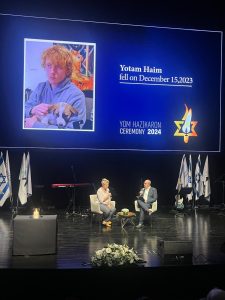 We attended an English-speaking ceremony at the Museum of Tolerance on Erev Yom Hazikiron. It was very moving. The keynote speaker was the previous head of the Mossad, Yossi Cohen. But the really emotional speeches were by those who had lost loved ones. Particularly moving was the mother of Yotam Hakim, who was mistakenly shot by the IDF after escaping his captors. Her strength and lack of blame towards the IDF was amazing.
We attended an English-speaking ceremony at the Museum of Tolerance on Erev Yom Hazikiron. It was very moving. The keynote speaker was the previous head of the Mossad, Yossi Cohen. But the really emotional speeches were by those who had lost loved ones. Particularly moving was the mother of Yotam Hakim, who was mistakenly shot by the IDF after escaping his captors. Her strength and lack of blame towards the IDF was amazing.
The wife of Saar Margolis told his story. Saar Margolis, 37, was killed protecting his family and the community while fighting off terrorists in Kibbutz Kissufim on October 7. His daughter, under 10, spoke so movingly about him.
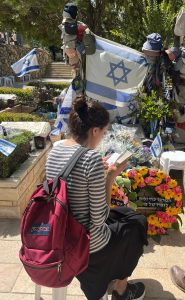 The following day we joined the many who went to Mt Herzl, Israel’s military cemetery, to pay our respects to those fallen. At 11.00am sirens sound for one minute around Israel, and everyone stops and stands to attention. The day is somber, similar to Anzac Day. The key differences are that the graves in Israel are recent (we visited graves of those killed on and around October 7) and that the release for Israelis is the transition to Yom Ha’atzmaut (Independence Day) as opposed to drinking and two-up. It is a very moving and sad exotic, but also very conformational … straight after the siren, a jet flies low overhead, reminding us of Israel’s determination to remain strong despite the sacrifice.
The following day we joined the many who went to Mt Herzl, Israel’s military cemetery, to pay our respects to those fallen. At 11.00am sirens sound for one minute around Israel, and everyone stops and stands to attention. The day is somber, similar to Anzac Day. The key differences are that the graves in Israel are recent (we visited graves of those killed on and around October 7) and that the release for Israelis is the transition to Yom Ha’atzmaut (Independence Day) as opposed to drinking and two-up. It is a very moving and sad exotic, but also very conformational … straight after the siren, a jet flies low overhead, reminding us of Israel’s determination to remain strong despite the sacrifice.
